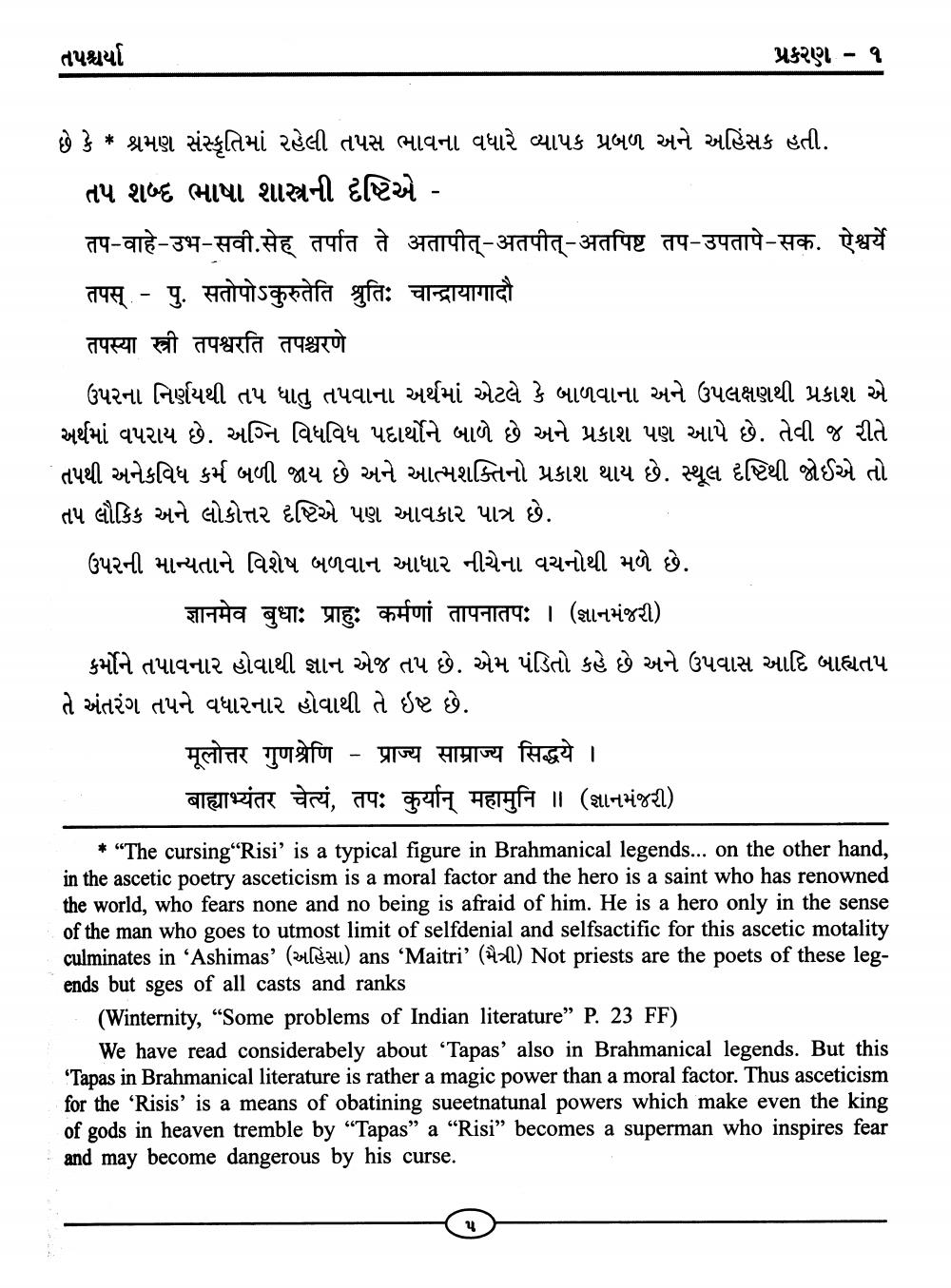________________
તપશ્ચર્યા
પ્રકરણ - ૧
છે કે * શ્રમણ સંસ્કૃતિમાં રહેલી તપસ ભાવના વધારે વ્યાપક પ્રબળ અને અહિંસક હતી. તપ શબ્દ ભાષા શાસ્ત્રની દૃષ્ટિએ - तप-वाहे-उभ-सवी.सेह् तर्पात ते अतापीत्-अतपीत्-अतपिष्ट तप-उपतापे-सक. ऐश्वर्ये तपस् - पु. सतोपोऽकुरुतेति श्रुतिः चान्द्रायागादौ तपस्या स्त्री तपश्वरति तपश्चरणे
ઉપરના નિર્ણયથી તપ ધાતુ તપવાના અર્થમાં એટલે કે બાળવાના અને ઉપલક્ષણથી પ્રકાશ એ અર્થમાં વપરાય છે. અગ્નિ વિધવિધ પદાર્થોને બાળે છે અને પ્રકાશ પણ આપે છે. તેવી જ રીતે તપથી અનેકવિધ કર્મ બળી જાય છે અને આત્મશક્તિનો પ્રકાશ થાય છે. સ્થૂલ દૃષ્ટિથી જોઈએ તો તપ લૌકિક અને લોકોત્તર દૃષ્ટિએ પણ આવકાર પાત્ર છે. ઉપરની માન્યતાને વિશેષ બળવાન આધાર નીચેના વચનોથી મળે છે.
- જ્ઞાનમેવ વધા: પ્ર. કર્મળાં તાપનાતિપ: I (જ્ઞાનમંજરી) કર્મોને તપાવનાર હોવાથી જ્ઞાન એજ તપ છે. એમ પંડિતો કહે છે અને ઉપવાસ આદિ બાહ્યતપ તે અંતરંગ તપને વધારનાર હોવાથી તે ઈષ્ટ છે.
मूलोत्तर गुणश्रेणि - प्राज्य साम्राज्य सिद्धये । વહ્યિાäતર વેલ્યું, તા: સુન મહામુનિ ! (જ્ઞાનમંજરી)
* "The cursing“Risi' is a typical figure in Brahmanical legends... on the other hand, in the ascetic poetry asceticism is a moral factor and the hero is a saint who has renowned the world, who fears none and no being is afraid of him. He is a hero only in the sense of the man who goes to utmost limit of selfdenial and selfsactific for this ascetic motality culminates in 'Ashimas' (US) ans 'Maitri' (all) Not priests are the poets of these legends but sges of all casts and ranks
(Winternity, "Some problems of Indian literature" P. 23 FF)
We have read considerabely about “Tapas' also in Brahmanical legends. But this 'Tapas in Brahmanical literature is rather a magic power than a moral factor. Thus asceticism for the 'Risis' is a means of obatining sueetnatunal powers which make even the king of gods in heaven tremble by “Tapas” a “Risi” becomes a superman who inspires fear and may become dangerous by his curse.




